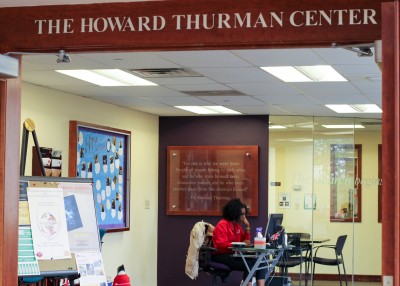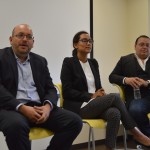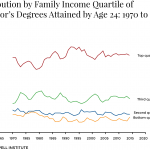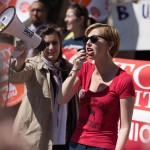
The Howard Thurman Visioning Committee submitted a report of recommendations Tuesday to Boston University President Robert Brown and Provost Jean Morrison regarding the expansion of the Howard Thurman Center for Common Ground. The recommendations aim to increase discussion among racially and culturally diverse communities on campus.
In December 2015, Brown charged the 11-member committee, comprised of faculty members and students, to compile a report of recommendations for the HTC’s future as a venue to celebrate diversity, according to the report sent to The Daily Free Press.
Morrison said she received the report on Friday. Increased attention on diversity-related issues on campus prompted the administration to focus on refining the HTC to fit the growing need to have further discussions, Morrison said.
“The effort [for the report] came about from a number of conversations from fall semester,” Morrison said. “It became clear we needed to see if there’s a way to expand the Thurman Center to help provide an expanded physical space, but also expand ways for faculty, staff and students at BU to have conversations we need to be having.”
The committee gathered inputs for the report from members of the community through an online survey and a number of listening sessions throughout the spring 2016 semester. Morrison said the recommendations vary, though a general consensus reported that the center’s physical inaccessibility — located in the basement of the George Sherman Union — is concerning.
“What they say is currently the Thurman Center is hard to get to, “Morrison said. “Their recommendation is that we’ve got to have it in a space that is visible, hospitable and acceptable. You should be able to see it from Commonwealth Avenue or Bay State Road, not have to go into a building, down the stairs, into the back corner.”
The center’s programs are also a concern of the committee, Morrison added. She said the report encourages more dynamic ways, such as utilizing the arts, to address racial and ethnic issues.
“A number of recommendations involve the arts to reach out and engage with what we know are difficult issues in the community,” Morrison said. “Maybe a small grant program for creative initiative and to develop and train a series of students and faculty who are really knowledgeable about issues so they can help educate our community.”
Morrison said the next steps include reviewing the report and planning for the center’s expansion.
“The report is really rich in creative, new ideas, and we are excited about possibilities,” Morrison said.
BU Student Government President Andrew Cho, who is part of the committee as a representative for SG, said student involvement in the committee has provided valuable insight to shape future plans for the HTC.
“The students have drawn everyone’s attention to the real and personal problems that the new center is hoping to address,” said Cho, a senior in the College of Arts and Sciences. “Faculty have backed up these concerns, and their support signifies a more lasting and holistic vision since we, as students, are only here for the short run.”
Cho said the committee discussed designating spaces for specific groups, including Latino and African-American communities, but also strives to create an inclusive space for all BU students.
“We arrived at the conclusion that while these communities are at the heart of the HTC’s mission, the HTC must exist as a center for all,” Cho said. “This sets it apart and makes it truly live up to the ethos of common ground.”
Several students said they agree with the expansion and look forward to what the HTC will be like in the future.
Myles Ullman, a freshman in the Questrom School of Business, said he agrees with the HTC’s ideas for expansion because he doesn’t feel like the HTC has a significant presence on campus aside from its weekly “Coffee and Conversation” gatherings.
“If they [the HTC] do a better job of promoting themselves and do things that would possibly promote more people, then more people would show up,” he said.
Jane Oberman, a junior in CAS, said though she has never been to the HTC herself, she has heard from a number of her friends that it is too small for its function.
“There were a lot of people sitting in [the HTC] trying to talk, and they had trouble fitting everyone in,” she said. “Expansion would be a really positive thing … It would also be good if they advertised it more. I’ve never really heard of the programs they have to offer.”
Chris DeLucia, a senior in the College of Engineering, echoed Ullman and Oberman. He said the much-needed expansion would increase the HTC’s accessibility, because it’s currently “tucked away” in the basement of the GSU.
“They have cool dialogues there, and it’s a good space to go and work … It would be more utilized as a space,” he said. “I’ve been there a couple times here and there, but I don’t go as often as I should.”
Grace Li contributed to the reporting of this article.





There are four sure-fire ways to keep up with the Thurman Center’s programming. You can choose to receive its weekly newsletter, subscribe to its events on Facebook, take a look at the BU calendar, or drop in while in the GSU and talk to one of our student employees or student ambassadors. Hope this helps!
Mailing List: http://www.bu.edu/thurman/email/
Facebook: https://www.facebook.com/BUHTC/
As someone who has been heavily involved in the HTC for four years, I wish that this article would have included a wider range of comments and perspectives. As it stands, it only includes comments from people who admit that they don’t spend time in the HTC or know about/participate in the programming. This highlights the need for the HTC to be more physically visible but does not get at the true value of the programming, which is really the driving factor behind the need to expand. This article would have benefited from including the perspective of people who are familiar with the HTC who could provide a less broad, more grounded explanation of the impact and value of the HTC, and how BU will benefit from the expansion of this impact and values.
Expanding the physical space and the reach of the HTC are not the point. They are only pathways to reaching the larger goals of expanding the ethos and character of the HTC to truly encourage breaking down barriers and seeking common ground throughout BU. This goal is largely missing from this article as there is no inclusion of people actually involved in the HTC and its programming.